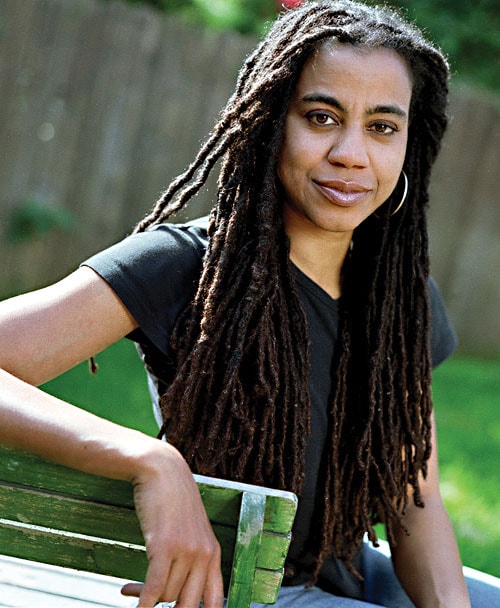This month we begin sharing our monthly newsletter on education and training themes. To sign up to get it in your mailbox, go here.
It’s hot, hot, hot in New York. The rising temperatures feel mentally and creatively stifling, but over the weekend I ventured to Little Island, a public park at Pier 55, to attend an event called “Work and Play” featuring Suzan-Lori Parks and Hansol Jung. It briefly distracted me from the heat.
The evening offered the attendees a taste of “Watch Me Work,” Parks’s weekly communal creative seminar in partnership with the Public Theater. A large crowd gathered on a grassy knoll overlooking the Glade stage. We took five minutes to independently work on something creative, then spoke about our creative process as a group.
Among the crowd were a budding producer, an aspiring novelist, a seasoned choreographer, a graphic designer, and, much to Parks’s delight, a college student studying physics who happened upon the event. Everyone had much to learn from Jung’s and Parks’s words on kickstarting creativity, building community, and practicing gratitude.
“Even if you don’t want to admit it today, know that you have a power beyond measure,” said Parks. “You are one of the guardians of the galaxy, believe it or not…It’s a big deal to be a creative person, and it should be celebrated.”
After the chat, Parks and her six-piece neo-soul band, Sula & the Joyful Noise, brought the house down as the sun set over the Hudson River. The physics student was so captivated by it all that he requested a selfie with Parks after the show. It filled me right up and I felt a pang to start a creative project of my own.
Later, I snagged a bar seat at the impossible-to-get-into Don Angie, where conversations about creativity continued with another solo diner next to me. She shared that she sold her UX design agency—with Fortune 500 company clients—and started writing plays during the pandemic shutdown. “Remember, we are here to create, not to work,” she said over a bowl of pasta.
The fear of rejection is such a hurdle to the creative process. I was so inspired by this piece in American Theatre about how to handle rejection.
Stay cool and get creative. And remember, we are all Guardians of the Galaxy!
Around the Web
• Loved this piece about Inner-City Arts, which makes all of Los Angeles a space of creativity for its students.
• How cool is TDF’s Graduation Gift program? New York City high school seniors can get deep discounts on shows.
• ICYMI, American Theatre’s latest roundup of theatre workers includes educators and puppeteers working with children.
• Check out this great article about theatre camp memories.
• Hurrah! The Educational Theatre Association has recognized several educators, arts administrators, and high school theatre programs with its 2024 EdTA Awards.
• Here’s a video recap of the International Thespian Festival last month.
On Social Media
Theatre educators: How do you prepare your students for rejection?
AT readers respond:
Jennifer Rohn
I urge them to develop a practice as an artist. It’s the thing you do everyday regardless of which way the wind blows. You are an artist-you know what your work is and every day you do your work.
John Patrick Bray
Two pieces of advice I was given and I use both: 1. Collect rejections. Aim for 30 no’s. Got a yes? Great! Congrats! Run with that opportunity. But! It doesn’t count. Next year, try for 50 no’s. Collect your no’s. 2. Always be the best apple you can be. Sometimes, a place is looking for an orange. An apple can never be an orange. So, be the best apple. Also, ours is a small world. The person casting for oranges probably knows someone casting for apples. Be the best apple you can be.
A.J. Allegra
I always try to emphasize that in this industry you can play the audition circuit but you can also play the build-it-yourself game. By that I mean that a good and robust theatre program should have a combo of both audition-based productions AND opportunities for students to self-produce work. Personally, I learned so many valuable lessons from the latter, and it absolutely let me continue to work happily and successfully in the industry.
Joey Rizzolo
I talk about casting in terms of temperament. No actor is appropriate for every role. Actors are not golems; made of clay, on standby, ready to be activated. Every actor has a self that comes through in their work. Sometimes that self is exactly what is needed for a role, as determined by a playwright, or a director, or producer. Sometimes it is not. It doesn’t make you a lesser actor, it just makes you not right for that role, in those given circumstances, at that time.
Katie Davis
Work ethic. You expect for it to take time for work to pay off. You learn to discipline yourself, even through disappointment, fatigue, or discomfort. We teach a process; we learn to trust ourselves.
Read more great responses here.
From the Archives

20 Questions with Suzan-Lori Parks
This 2010 Q & A with Parks talks about teaching creativity with “Watch Me Work” and her aspirations of starting a band.


